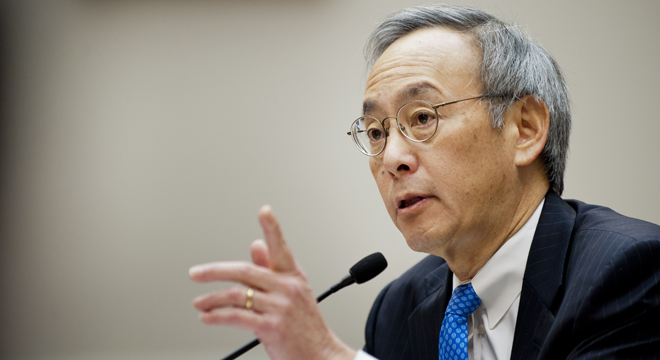Energy Secretary Steven Chu was on Wednesday subjected to over three hours of grilling from House lawmakers investigating the $535 million loan guarantee his agency granted to Solyndra, a solar company favored by the White House that went bankrupt in August.
But throughout the hearing conducted by the House Energy and Commerce Committee’s Subcommittee on Oversight and Investigations, Chu maintained his calm and repeatedly rebuffed Republican suggestions that the Obama Administration influenced the Energy Department’s decision making in any way.
Concerning the Solyndra loan guarantee, Chu said in his opening remarks that the “final decisions were mine. I made them with best interests of taxpayer in mind. I did not make any decision based on political consideration.”
Later, when questioned by Rep. Diana DeGette (D-CO) about the process that led the Energy Department to “reverse” the decision it made under the Bush Administration not to approve Solyndra’s loan guarantee, Chu explained that there had been, in fact, no such “reversal,” as some Republicans have accused, and surely not a politically motivated one.
“What happened when I became Energy Secretary, beginning with my confirmation, was that there was tremendous interest in getting the loan program going. I was told by Energy career people, who had been there during the previous [Bush] administration, that Solyndra was the first loan in line,” Chu said.
Chu explained that although the loan guarantee had not been approved by the Energy Department during the waning weeks of the Bush Administration, it also wasn’t rejected outright, only labeled as containing “incomplete information.” Instead, the loan guarantee application had been sent back to Solyndra with further questions from the Energy Department.
“The same career folks said: ‘You satisfied our questions. We recommend moving forward with loan,’ so that’s what we did,” Chu said.
Chu also admitted that he and the Energy Department were alone responsible for restructuring the loan in February so that private investors would get paid before the government in bankruptcy recovery.
In addition, Chu said they undertook that process without any prompting from the White House or anyone connected to the President, including billionaire Obama campaign bundler George Kaiser, whose family foundation was a major private investor in Solyndra.
“Did anyone from the Obama Administration or any campaign donor tell you to undertake restructuring?” asked DeGette.
“No, none ever did,” Chu said.
Still, lawmakers seemed to be obsessed with the restructuring.
“There were a number of us here when we put the loan program into effect,” said Rep. Gene Green (D-TX), “…we never imagined that taxpayer money was subordinated in recovery.”
“We went through a very rigorous process,” before deciding to restructure, Chu said.
Chu also noted that the controversial decision to restructure the Solyndra loan was initiated in late 2010 before it was finalized in February this year, and that it was conceived in an attempt to keep then-ailing Solyndra afloat long enough to recoup more taxpayer money in the event of a bankruptcy.
As Chu put it: “By that time, [Solyndra] had a half-completed factory,” Chu said, referring to the $733 million Fab 2 manufacturing plant in Fremont, California, which Solyndra completed in November 2010, ahead of schedule and under budget.
“We had a difficult decision to make,” Chu continued, “We could stop the loan, and make Solyndra go immediately into bankruptcy. Or, we could complete the factory and give Solyndra a chance to keep going.”
The restructuring decision had also been approved by Energy Department’s lawyers and an outside firm, Morrison & Foerster.
“We’d like a copy of that [approval],” said the Republican subcommittee Chairman, Rep. Cliff Stearns (R-FL), in a huff.
“Why didn’t you go ahead and submit this [restructuring plan] to the Justice Department to get their legal opinion on it?” asked Rep. Phil Gingrey (R-GA)
“One only goes to the Justice Department if there are changes in the legal conditions of the loan,” Chu responded.
Republicans, however, accused him of breaking the law by restructuring the loan. They pointed to the Energy Policy Act of 2005, the bipartisan legislation that enacted the loan guarantee program in the first place, which specifically reads “The obligation shall be subject to the condition that the obligation is not subordinate to other financing.”
Rep. Joe Barton (R-TX), who, as the Guardian notes, should be remembered for apologizing to BP during the midst of the 2010 oil spill crisis, pressed Chu repeatedly on this restructuring point.
“Do you know what the word ‘shall’ is?” Barton asked Chu. “Do you know what ‘obligation’ is?”
Chu, a Nobel Prize in Physics laureate, answered “yes” to both of Barton’s questions, but pointed out that it wasn’t the terms of the loan guarantee itself in which the government was made subordinate to private investors, but rather the restructuring, this making it a legal move.









